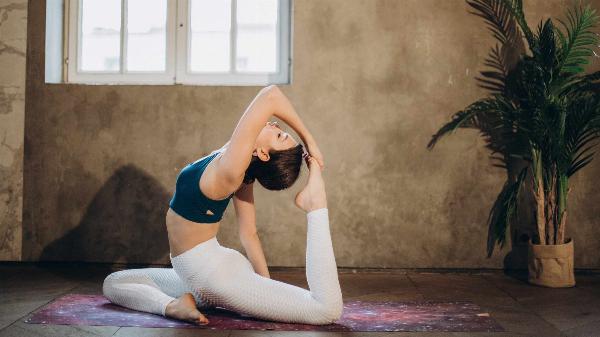The Ultimate Guide to Hatha Yoga: Benefits, Techniques, and More

Strong 8k brings an ultra-HD IPTV experience to your living room and your pocket.
For ages, Hatha Yoga has been a vital component of mental and physical well-being, since it balances the mind, body, and soul. Known for its soft and contemplative style, Hatha Yoga has several advantages, ranging from strengthening and increasing flexibility to boosting general wellbeing. This manual explores the fundamentals of Hatha Yoga, its advantages, and how to incorporate it into your everyday routine.
The Origins and Philosophy of Hatha Yoga
Hatha Yoga is a traditional Indian form of yoga that stresses the harmony between our mental and physical selves. "Hatha" is derived from the Sanskrit terms "Ha," which means sun, and "Tha," which means moon. It represents the bringing together of opposites. This discipline combines a variety of asanas (postures), pranayama (breathing exercises), and meditation to align the body's energy channels, or chakras.
Advantages of Hatha Yoga
Your physical and mental well-being can be greatly improved by Hatha Yoga practice. Here are a few main advantages:
Improved Flexibility and Strength: A set of poses known as Hatha Yoga work to strengthen and extend muscles, increasing physical strength and flexibility. Those who want to expand their range of motion and lay a strong basis for more difficult yoga poses may find it very helpful.
Stress Relief and Mental Clarity: Hatha Yoga uses physical postures and conscious breathing to help lower tension and anxiety. It is a great mental health practice since it promotes inner serenity and mental clarity.
Enhanced Physical Health: The immune system, the pulmonary system, and cardiovascular health can all be improved with regular Hatha Yoga practice. Additionally, it is believed to facilitate digestion and enhance general posture.
Balance and Harmony: The purpose of Hatha Yoga is to create harmony by balancing the body and mind. Better sleep, increased wellbeing, and enhanced concentration can result from this equilibrium.
Hatha Yoga for Flexibility and Strength
Hatha Yoga has several advantages, but two of its main ones are increased strength and flexibility. Practitioners can strengthen and stretch their muscles, tendons, and ligaments by holding postures for lengthy periods of time. This exercise is especially beneficial for people whose bodies are tight or uncomfortable as a result of sedentary lives or repeated motions.
Including Hatha Yoga in Your Daily Schedule
Online Yoga Classes
Getting access to Hatha Yoga sessions has never been simpler thanks to the growth of digital platforms. The freedom to practice at your own speed and on your own schedule is provided by online yoga classes. It is easy for both novice and seasoned practitioners to include Hatha Yoga into their daily routines because so many qualified instructors provide virtual classes.
Yoga Therapy
For a variety of medical and psychological issues, Hatha Yoga is also a therapeutic exercise. Yoga therapy is a modality that integrates ancient yoga practices with contemporary medical expertise to address chronic pain, lower stress levels, and aid in the healing process following injuries. People with ailments like arthritis, back pain, and mental health issues might benefit most from it.
Getting Started with Hatha Yoga
Look for a Cozy Area
To start, identify a peaceful, comfortable area in your house where you may practice without interruptions. Ascertain that you own a yoga mat, cozy attire, and any essential equipment, including straps or blocks.
Commence with the Fundamental Postures
Start with simple, straightforward poses if you're new to Hatha Yoga. Several basic positions consist of:
Mountain Pose (Tadasana): This pose enhances balance and alignment.
Downward-facing dog Pose: Stretching the hamstrings and calves is a terrific use of the downward-facing dog position (Adho Mukha Svanasana).
Vrksasana (tree pose): strengthens the legs and improves balance.
Peaceful Child's position (Balasana): This position eases shoulder and back strain.
Add Pranayama to the mix
Hatha yoga relies heavily on breathing exercises, or pranayama. Techniques that assist relax the mind and improve lung capacity include diaphragmatic breathing and alternating nostril breathing (Nadi Shodhana).
The Secret Is Consistency.
Consistency is key if you want to reap the full advantages of Hatha Yoga. Make it a point to practice for 20 to 30 minutes every day. You may progressively lengthen and intensify your lessons as you get more used to the fundamentals.
In conclusion
The mind, body, and soul may all benefit greatly from the transforming practice of Hatha Yoga. Hatha Yoga offers a gentle and efficient way to achieve these objectives, whether your goals are to increase strength and flexibility, lower stress levels, or improve your general well-being. It's easier than ever to incorporate Hatha Yoga into your daily routine thanks to the availability of online yoga classes and the therapeutic advantages of yoga therapy. Begin your journey now to discover the amazing effects this age-old practice may have on your life.
FAQs:
Q: How does Hatha Yoga work?
In order to enhance both physical and mental well-being, Hatha Yoga emphasizes physical postures, breathing exercises, and meditation.
Q: Is Hatha Yoga suitable for beginners?
Because it is mild and approachable, Hatha Yoga is appropriate for beginners.
Q: When should I do Hatha Yoga classes?
Hatha yoga can have major advantages if practiced daily or at least three to four times per week.
Q: What is required for me to begin practicing Hatha Yoga?
A yoga mat, cozy clothes, and a peaceful area are necessities for this exercise.
Q: Is it possible to reduce stress with Hatha Yoga?
Yes, Hatha Yoga uses both physical poses and conscious breathing to help practitioners relax and cope with stress.
Q: Is Hatha Yoga appropriate for all age levels?
Absolutely, people of all ages and physical levels may practice Hatha yoga due to its adaptability.
Q: Exist any classes offering Hatha Yoga online?
Indeed, a plethora of "online yoga classes" are accessible, providing practitioners with flexibility and convenience.
Q: How can Hatha Yoga increase strength and flexibility?
A sequence of postures in Hatha Yoga work the muscles in the body, increasing flexibility and general strength.
Q: Yoga Therapy: What Is It?
Yoga therapy is an approach to treating a range of physical and mental health issues that integrates traditional yoga practices with contemporary medical understanding.
Q: Can chronic pain be managed with Hatha Yoga?
Yes, by enhancing strength, flexibility, and relaxation, Hatha yoga can help reduce chronic pain.
Note: IndiBlogHub features both user-submitted and editorial content. We do not verify third-party contributions. Read our Disclaimer and Privacy Policyfor details.



